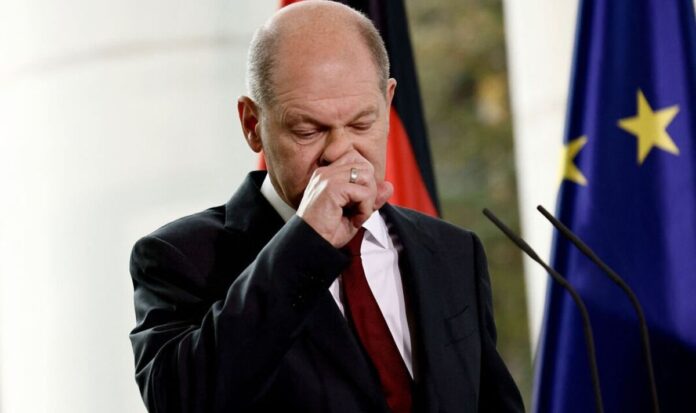The German Chancellor is travelling to Beijing on a solo trip that infuriated allies both in the EU and the US. Mr Scholz will meet President Xi Jinping and Premier Li Keqiang during Friday’s one-day visit. With China still imposing tough COVID-19 restrictions, his delegation will not stay in Beijing overnight.His visit comes just after Xi was named to a third term as head of the ruling Communist Party and promoted allies who support his vision of tighter control over society and the economy.It is also accompanied by rising tensions over Taiwan and follows a UN report that said Chinese human rights violations against Uyghurs and other ethnic groups may amount to ‘crimes against humanity.’A senior German official, who briefed reporters on condition of anonymity in line with department rules, characterised the visit as ‘an exploratory trip’ to find out ‘where China stands, where China is going and what forms of cooperation are possible with this specific China in the current global situation.’Mr Scholz’s visit to Beijing will be the first by an EU leader since the start of the COVID-19 pandemic. Olaf Scholz will travel to China on a solo trip (Image: Getty) China’s President Xi Jinping will meet Scholz on Friday (Image: Getty)He has faced criticism ahead of the trip for allowing Cosco to invest in Hamburg, despite strong pushback from his governing coalition partners amid concerns over Chinese influence over critical infrastructure.French and German government sources told Reuters French President Emmanuel Macron had suggested to Scholz they go together to Beijing to send a signal of EU unity to Beijing and counter what they see as Chinese attempts to play one country over another.But the German leader reportedly declined Mr Macron’s offer.On Monday, European Commissioner Thierry Breton appeared to take a swipe at the German leader’s decision to travel solo to Beijing.In an interview with Reuters, the EU’s industry chief said that European governments must realise China is a rival to the EU and warned leaders against being naive.”We need to be extremely vigilant,” he said.READ MORE: Putin facing rare dissent from Russia’s news mediaHe added: “It’s up to member states to use them and change their behaviour.”It’s very important that the behaviour of member states towards China… change in a way that’s more coordinated than individually-driven, as China obviously wants us to be.”The era of naivete is over. The European market is open, with conditions.”A German official pointed to China’s ‘particular responsibility’ as an ally of Russia to help end the war in Ukraine and press Moscow to tone down its nuclear rhetoric; to concerns over tensions in Taiwan and the broader region; to Germany’s desire for a ‘level playing field’ in economic relations; and to Scholz’s current status as this year’s chair of the Group of Seven industrial powers.Even as political relations have grown tenser, business ties have flourished. China was Germany’s biggest trading partner in 2021 for the sixth consecutive year, its biggest single source of imports and its No. 2 export destination after the U.S.Mr Scholz’s government has sought to balance those ties with recognition that China is increasingly a competitor and ‘systemic rival,’ as well as a partner on issues such as climate change. His three-party coalition has pledged to draw up a ‘comprehensive China strategy.”DON’T MISS:Dan Wootton hails Italians as drivers deal with Extinction Rebellion [VIDEO]Russian conscripts ‘play dead’ on frontline [INSIGHT]Braverman now plans to send Channel migrants to Paraguay [ANALYSIS]That is still pending. But Russia’s war in Ukraine is concentrating minds as Germany grapples with the fallout of having depended on Russia for over half its natural gas supplies. This year, Germany has scrambled to end that dependence, while Russia eventually shut off supplies.Foreign Minister Annalena Baerbock said Sunday that she fears ‘that a mistake Germany made in recent years with Russia could be repeated.’ And, she told ARD television, ‘we must prevent that.’Ms Baerbock’s comments came after the government argued over whether to allow China’s COSCO to take a 35% stake in a container terminal at the Hamburg port. Baerbock and others in two junior coalition parties opposed the deal while Scholz downplayed its significance. In a compromise, COSCO was cleared to take a stake below 25%, above which an investor can block a company’s decisions.Mr Scholz has appeared to tread a middle path on China. Unlike his two immediate predecessors, he made Japan rather than China his first Asian destination. He is encouraging companies to diversify, but isn’t discouraging business with China.After an EU summit last month, he said: ‘No one is saying that we have to get out of there, we can’t export there any more, we can’t invest there and we can’t import from China any more.’But, in an increasingly multipolar world, ‘we shouldn’t concentrate on just a few countries,’ he said, adding that ‘not putting all your eggs in one basket” is wise.Defending his trip, Mr Scholz said in an article for the Frankfurter Allgemeine Zeitung newspaper that he’s traveling ‘as a European,’ and Berlin consulted closely with European and trans-Atlantic partners before the visit. He said ‘Germany’s China policy can only be successful if embedded in a European China policy.’
Scholz forced to defend himself for solo trip to China after criticism
Sourceexpress.co.uk
RELATED ARTICLES


